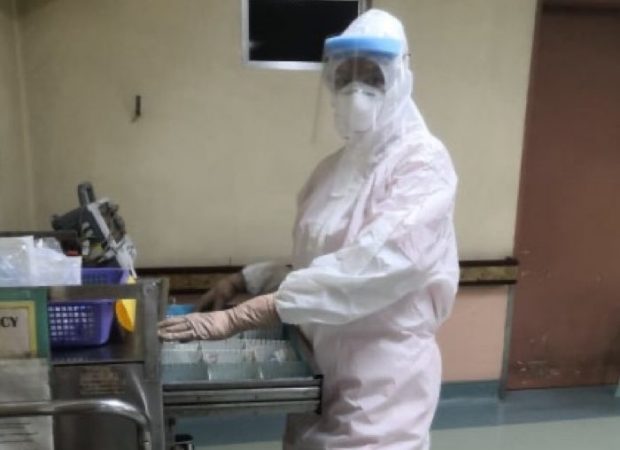Fighting a pandemic: When healers need healing themselves

THE BEST AND WORST IMPULSES Risking infection by the coronavirus as they provide care for patients on their watch, medical workers also face discrimination by people afraid for their lives. —PHOTO COURTESY OF KATH VALDEZ
MANILA, Philippines — “You really need to be strong in this profession,’’ said Kath Valdez, a ward nurse at the Philippine General Hospital (PGH) in Manila, who has seen how the usually crowded halls of PGH turned empty and eerily quiet, except for the muffled suffering of patients battling a virulent disease that has also taken its toll on health workers like her.
“(You have) to put so much heart into it so that you can help people (deal), not only with their physical pain but also the emotional and mental challenges they are going through,” she said.
After PGH was designated by the Department of Health as an “end referral hospital” for COVID-19 cases, Valdez recalled, she started taking care of one patient whose condition was made worse by bouts of depression. Two of the patient’s family members had died from COVID-19, while the rest were recovering.
“She is isolated and alone in PGH, and cannot do anything. It’s too sad to see patients like that. All I can offer is myself, a person who will listen to her,” said Valdez.
Health workers get so invested in their work that they sometimes forget to take care of themselves, she said, and “this eventually leads to burnout and similar challenges.”
Article continues after this advertisementAnother source of anguish
But lately, another source of their mental anguish has surfaced — one that stalks nurses and health workers the moment they step out of the hospital.
Article continues after this advertisementValdez has experienced it herself: One day as she walked home, her neighbors hurried back inside their houses, avoiding her like the plague. She has also heard stories of health workers being forced out of their rented places because of fear that they could infect the entire community.
“I know (people) are just being careful,” she said. “But I wish they would be kinder and more considerate to us, especially during this time of crisis,” Valdez said.
Support groups
To help themselves cope, nurses in the state-run hospital turn to their support group—“PGH Care Society”—to help each other out of emotional and psychological lows through professional and peer interventions.
Other groups, such as Ugat Foundation and the University of the Philippines Diliman’s PsycServ (UPD PsycServ), have been offering telepsychotherapy and psycho-emotional counseling services for front-line health workers and people experiencing stress or anxiety during the COVID-19 pandemic.
Like other PGH nurses, Valdez has developed the fear of getting the virus and infecting others, as well as a sense of helplessness for not being able to do everything for the patients.
“We’ve also faced (cases of) infectious diseases in the past, but this is something that we didn’t expect to blow up like this. It totally changed our working environment. There is fear, anxiety, and uncertainty all around,” said Valdez, who lives with friends in Manila while her entire family is abroad.
The PGH Care Society, a mental health advocacy group whose members include Valdez, provides a platform for nurses to freely express their feelings as a form of unburdening and release. Through online exchanges, they can hopefully unload negative feelings and deal more strongly with “one of the most challenging times of their career,” Valdez said.
Online counseling
Ugat Foundation, meanwhile, is a group helping Filipino families, overseas Filipino workers (OFWs) and marginalized individuals cushion the physical and psychological impact of the coronavirus outbreak.
On April 2, it launched Ugat Sandaline, an online platform that provides psycho-emotional counseling services to people affected by the pandemic, especially medical front-liners and other responders deployed by the government.
“They need a lot of support now, and hopefully, crisis counseling empowers them in their valiant efforts to fight COVID-19 and ensure the safety and health of the Filipino people,” the group said.
Ugat Sandaline volunteers include psychologists, mental health professionals, and psychology graduate students who are trained to listen to and empathize with those needing emotional support, whether through video, voice call or online chat.
“In cases such as pandemics, when compliance is critical to the nation’s efforts to ‘flatten the curve,’ feeling heard or having an outlet to ventilate feelings will hopefully also enable more (people) to comply with national and local government efforts,” the group said in a statement.
For other ‘essential’ workers
A third help group, UPD PsycServ, has expanded its free telepsychotherapy services to reach out not only to health workers but also to persons under investigation or monitoring for coronavirus symptoms, and COVID-19-positive individuals and their relatives.
It also offers a comforting hand to security guards, store cashiers, janitors and other “essential” workers who still have to go to work—and face the risk of being infected—while the Luzon-wide lockdown is in effect.
Online sessions with the group can be scheduled through text, Viber or an online form posted on the group’s Facebook page.
Sometimes a simple “kumusta” (how are you?) suffices to renew their strength, Valdez said.
“As health workers, we’re used to asking others: Kumusta ka? So it’s time that we also take care of our fellow nurses and front-liners,” she said. “That one simple question can totally change someone’s perspective and feelings.”
For more news about the novel coronavirus click here.
What you need to know about Coronavirus.
For more information on COVID-19, call the DOH Hotline: (02) 86517800 local 1149/1150.
The Inquirer Foundation supports our healthcare frontliners and is still accepting cash donations to be deposited at Banco de Oro (BDO) current account #007960018860 or donate through PayMaya using this link.